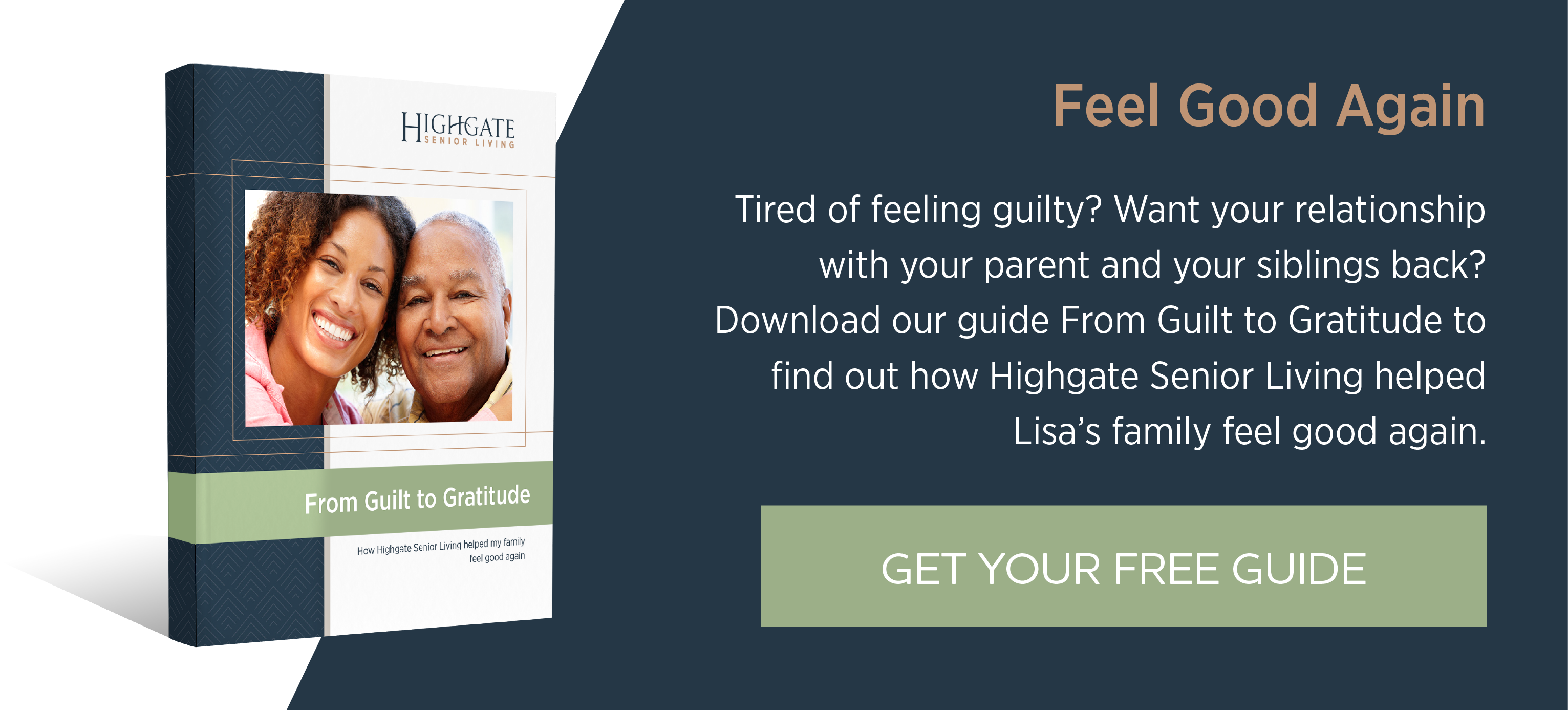
For many years, Lisa was used to sleeping with one eye and one ear open just in case something happened to her mom and dad. It was not like the day after her dad, James, moved into memory care that she started sleeping soundly, but it was pretty soon after.
“One day, you wake up and go: ‘Oh, my goodness. I slept! I didn’t worry!” Lisa says. “It happens without you even knowing it happens. It’s almost like an acceptance. You’ve started accepting this is the way it is. It’s a new normal.”
From Anxious to Peace of Mind
James has a new normal, too, and it involves fine dining, social hours, and fun activities with friends and family. One of his newest friends is Mel Taylor, who works in the activities department.
“Dad absolutely loves her,” Lisa says. “He knows her and he will tell me when I’m up there, ‘That’s my buddy.’ And she is. He lights up when he sees her.”
One of the reasons Lisa and her sister Ruth knew Highgate was the right fit for their dad was because there is a lot of activity and their dad could be active still.
“It’s a cheery place. It’s homey, inviting, and the people look happy, look clean, look well-taken care of. And they actually do things,” Lisa says. “Mel goes up to my dad and says, ‘James, we’re going to do this.’ He’ll tell her no, but she’ll just show him her hand. He takes it, and off they go. On days I don’t get up there, I know Mel is there, and she’s going to be taking care of him.”
From Caregiver to Daughter
Now when Lisa does go visit her dad, she does not have to be his caregiver anymore.
“When I go up there, I don’t have to be the brat or the mean one who is saying, ‘You need to do this!’ He’s happy. He’s thriving. When he starts being goofy, I can enjoy the goofiness. I don’t feel like, oh, I don’t have time for this because I have these 10 other things I need to be doing.”
“Now, we can be as goofy as we want because there’s nowhere else I need to be,” she continues. “I’m there to be the daughter and not the caregiver.”
From Guilt to Gratitude
For family caregivers who are struggling with feelings of guilt or having challenges making long-term care decisions with one another, Lisa says if you are in this situation, talk to someone who has been there, too.
“My mom had a friend whose husband had dementia and passed away,” she says. “When my mom was dying, her friend came up here to visit. She kept telling me — because she had been in my shoes — I wish I would have moved him to memory care sooner because he was happier and I was happier. I didn’t believe that could be true, but it is.”
Another thing Lisa says is key is communication. Ask your parents and your siblings about what is important to them.
“My mom was very strong-willed, so some of the challenges we might have encountered we avoided because my mom had laid the groundwork for it,” she says. “As parents, you need to let your wishes and your wants be known. You need to talk to your children long before you’re sick. It’s too late when they’re dying to be making decisions.”
“When decisions are made without the emotion, they can be made a lot easier,” she continues. “Then when it’s time, you can deal with the emotions and not the logistics. That was the easier part for us. Ruth and I knew what we had to do because Mom had already told us. We dealt with the emotions of her passing, but we already knew what the logistical plan was for dad.”
The last piece of advice Lisa offers is to work with your loved one’s care partners and team members, not against them.
“At Highgate, they don’t do it because it’s a job,” she says. “They’re there because they like what they’re doing. They have compassion and empathy. Don’t make it harder for them. Work with them.”
“I’m not saying it’ll make your loved one’s experience better — they’re going to take care for them whether you’re a jerk or not — but it makes your experience better,” she continues. “If you show compassion to them, too, and work as a team with them, it’s better for everybody.”
It is possible to transform guilt into gratitude. To read the rest of Carter’s story, download our eBook From Guilt to Gratitude: How Highgate Senior Living Helped My Family Feel Good Again.






